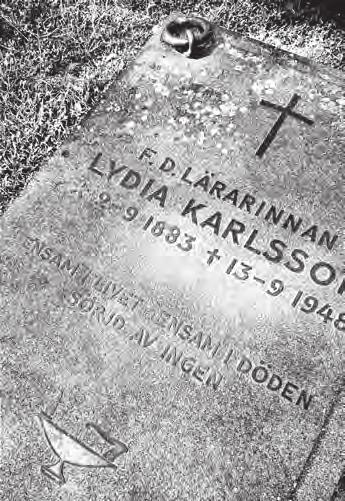 "Alone in life, alone in death, mourned by no one" ("Ensam i livet, ensam i döden, sörjd av ingen" in Swedish). The epitaph is an appeal of the departed to visitors, who is asked to stop for a moment and read the inscription. The headstone inscription stand out compared with other inscriptions like "A long life well lived", "Always together", "Always loving", "Always loved", "At peace", "At rest" et cetera. You can find the epitaph at Ukna cemetery in Linköping diocese, in the south-east of Sweden. It is written on the headstone of retired primary school teacher Lydia Viktoria Matilda Karlsson who died in 1948. About ten years ago we were visiting friends at their summer house not far from Ukna. One day we went for a drive and our friends showed us the headstone. What does it mean? A bitter comment placing guilt on your fellow human beings or a resignated conclusion that life didn't turned out the way you wanted or expected? And everything in between. Let's deconstruct the inscription. "Alone in life". Lydia grew up with her mother, father, brother and half-siblings. Her father had nine children from a previous marriage (his first wife died in 1880). Lydia was a primary school teacher, teaching 7-8 year old children. She remained unmarried throughout her life and never had any children. "Alone in death". Lydia retired in 1944 and died four years later. The cause of death was cerebral hemorrhage and pneumonia. It's unclear whether she died alone. It was clear from the will that she wanted to be buried in Ukna and the pallbearers were to be found local. "Mourned by no one". It's unclear whether she was mourned or not. Lydia left an estate. There where six beneficiaries (a niece, two half-siblings, and three descendants to deceased half-siblings). The estate consisted of 51 650 SEK (today about 1 082 600 SEK or $106 400) in bank savings, a gold clock, some rings, table silverware, an organ, a radio, a loom and furnitures. The headstone inscription is tragic. The irony in this story is that you lived your life unseen, unnoticed and unconfirmed and then when you're dead - only then - you are seen, noticed and confirmed. Anyway, the headstone inscription qualifies for the list of famous last words.
"Alone in life, alone in death, mourned by no one" ("Ensam i livet, ensam i döden, sörjd av ingen" in Swedish). The epitaph is an appeal of the departed to visitors, who is asked to stop for a moment and read the inscription. The headstone inscription stand out compared with other inscriptions like "A long life well lived", "Always together", "Always loving", "Always loved", "At peace", "At rest" et cetera. You can find the epitaph at Ukna cemetery in Linköping diocese, in the south-east of Sweden. It is written on the headstone of retired primary school teacher Lydia Viktoria Matilda Karlsson who died in 1948. About ten years ago we were visiting friends at their summer house not far from Ukna. One day we went for a drive and our friends showed us the headstone. What does it mean? A bitter comment placing guilt on your fellow human beings or a resignated conclusion that life didn't turned out the way you wanted or expected? And everything in between. Let's deconstruct the inscription. "Alone in life". Lydia grew up with her mother, father, brother and half-siblings. Her father had nine children from a previous marriage (his first wife died in 1880). Lydia was a primary school teacher, teaching 7-8 year old children. She remained unmarried throughout her life and never had any children. "Alone in death". Lydia retired in 1944 and died four years later. The cause of death was cerebral hemorrhage and pneumonia. It's unclear whether she died alone. It was clear from the will that she wanted to be buried in Ukna and the pallbearers were to be found local. "Mourned by no one". It's unclear whether she was mourned or not. Lydia left an estate. There where six beneficiaries (a niece, two half-siblings, and three descendants to deceased half-siblings). The estate consisted of 51 650 SEK (today about 1 082 600 SEK or $106 400) in bank savings, a gold clock, some rings, table silverware, an organ, a radio, a loom and furnitures. The headstone inscription is tragic. The irony in this story is that you lived your life unseen, unnoticed and unconfirmed and then when you're dead - only then - you are seen, noticed and confirmed. Anyway, the headstone inscription qualifies for the list of famous last words.
Featured
"Alone in life, alone in death, mourned by no one"
Konztroll
Hits: 2105
